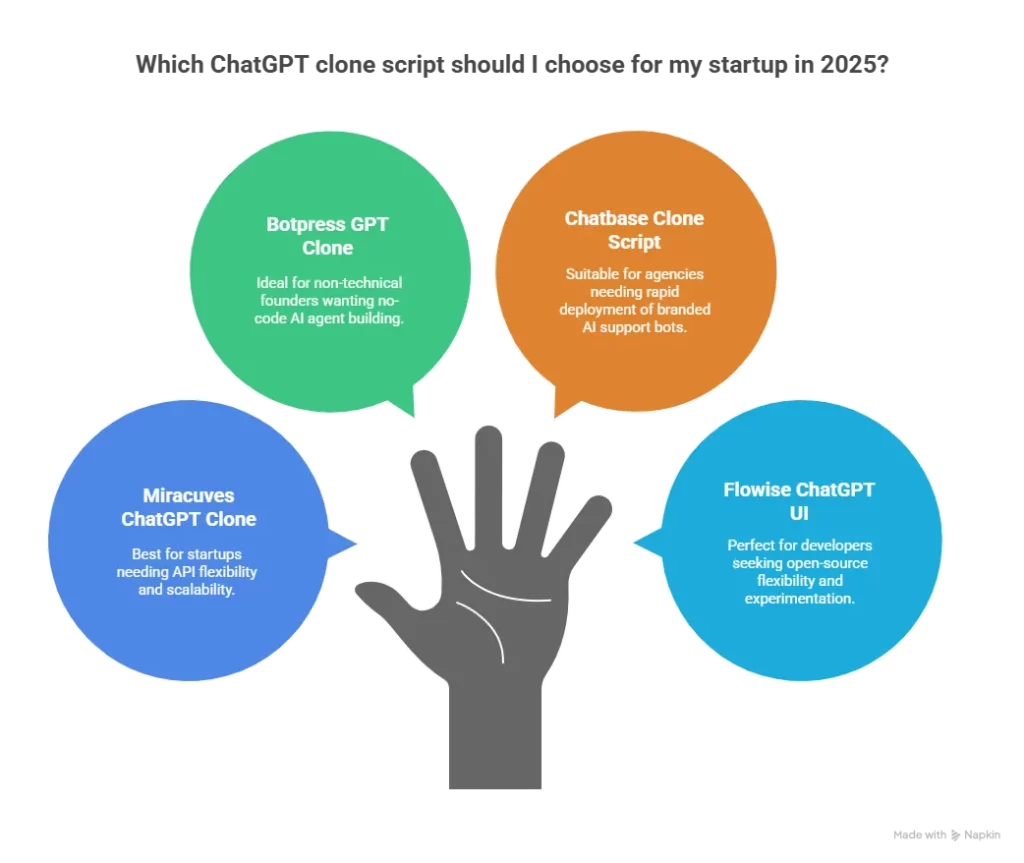Let’s be honest — AI is no longer a buzzword. It’s a business model. Ever since ChatGPT turned the world upside down with natural conversations and mind-bending capabilities, every tech founder has been itching to build their own conversational AI platform. Whether you’re a solopreneur exploring niche AI assistants or a startup hunting for SaaS gold, launching aChatGPT clone scripts in 2026 is a smart — and scalable — move.
But here’s the challenge: not everyone has OpenAI’s budget or engineering muscle. You can’t afford to spend months on model fine-tuning or backend infrastructure when your MVP needs to ship yesterday. That’s where ChatGPT clone scripts come in — they cut the fluff, offer plug-and-play core functionality, and let you focus on what really matters: use-case differentiation.
If you’re thinking about building your own ChatGPT-style app, chatbot interface, or AI-powered assistant, this guide breaks down the top clone scripts in 2026, including their features, pros, cons, and pricing. Let’s get into it.
Why Launch a ChatGPT Clone in 2026?
AI Adoption Is Mainstream
From customer support to writing tools, therapy bots to productivity coaches, AI-powered chat interfaces are being embedded everywhere. According to recent surveys, 64% of businesses are already using AI in some form — most of them in conversational formats.
Language Models Are More Accessible
With APIs like OpenAI, Claude, and Mistral now offering developer access, you don’t need to train a massive LLM to launch. Instead, you can build a custom interface, plug into these models, and offer a unique experience with your own branding and monetization hooks.
Niche AI Assistants Are Booming
General-purpose AI is great, but the real growth lies in specialization. Think therapy chatbots, legal advisors, fitness coaches, or career mentors — all driven by the same LLMs but wrapped in specific, relatable interfaces. This is where a ChatGPT clone becomes your canvas.
Read More ;How can I market my ChatGPT clone app successfully?
Core Features You Should Expect in a ChatGPT Clone Script
Not all clones are created equal. If your script only parrots answers without memory, prompt history, or personalization — it’s just a glorified FAQ. A real ChatGPT clone in 2026 should have the following:
Frontend Experience
- Clean chat UI with context threading
- Custom prompt presets
- Dark/light mode switch
- Chat history management
- Mobile responsiveness or dedicated apps
Backend & Logic Layer
- API connector to OpenAI, Claude, or custom model
- Prompt engineering tools or templates
- Access token/security management
- Rate-limiting and session management
Admin Features
- Analytics dashboard (user queries, session lengths, popular prompts)
- User management (roles, limits, ban options)
- Subscription and billing controls
- Email and webhook notifications
Optional advanced features include memory retention, image input, voice-to-text, and multi-language capabilities — especially relevant for niche-focused chatbots.
Read More : How to Replace Google Assistant with ChatGPT Voice Using MXAIVOICE
Best ChatGPT Clone Scripts in 2026

1. Miracuves ChatGPT Clone
Overview: A flexible, API-ready solution designed for startups building verticalized AI assistants or SaaS products. Highly customizable and LLM-agnostic.
Top Features:
- Plug-and-play with OpenAI, Claude, Mistral APIs
- Role-based personas (e.g., “career coach,” “travel agent”)
- Clean chat UI with full history
- Stripe billing integration
- Multi-language support
Best For: SaaS founders or startups targeting niche AI markets
Pros: Modular, highly scalable, built with developers in mind
Cons: Requires API keys and usage-based model billing separately
2. Botpress GPT Clone
Overview: Designed for teams that want to build AI agents using no-code tools. Includes workflows and NLP training options.
Top Features:
- Visual bot builder
- Natural language flow control
- Supports HuggingFace models and OpenAI
- Role-based user access
Best For: Non-technical founders or enterprise teams building AI agents
Pros: No-code, workflow-first, ideal for multi-turn bot experiences
Cons: Less control over deep customization
3. Chatbase Clone Script
Overview: A SaaS-focused script allowing users to train chatbots on their own data — PDFs, links, or CSVs.
Top Features:
- User uploads documents for training
- Built-in chatbot deployment links
- Web chat widget
- API key protection
Best For: Agencies and no-code builders wanting branded AI support bots
Pros: Rapid launch, customer data-specific responses
Cons: Limited scope beyond website support
4. Flowise ChatGPT UI
Overview: An open-source interface built on Langchain with visual node editing. Popular among hobbyists and devs.
Top Features:
- Drag-and-drop workflow builder
- Connects with various LLMs
- Vector store integrations
- Open source, self-hostable
Best For: Developers who want to experiment without vendor lock-in
Pros: Full transparency and flexibility
Cons: Requires significant technical setup
Read More : Reasons startup choose our chatgpt clone over custom development
Cost Factors & Pricing Breakdown
ChatGPT-Like AI Assistant Platform Development — Market Price
| Development Level | Inclusions | Estimated Market Price (USD) |
|---|---|---|
| 1. Basic AI Chat MVP | User login, text-based chat interface, basic AI responses, conversation history, simple admin panel, and usage limits. | $60,000 |
| 2. Mid-Level Conversational AI Platform | Web + mobile UI/UX, advanced prompt handling, multi-conversation support, user roles, moderation tools, analytics, notifications, and API integrations. | $140,000 |
| 3. Advanced ChatGPT-Level AI Platform | Multi-model support, context memory, fine-tuning controls, plugin/API ecosystem, usage-based billing, enterprise dashboards, security layers, and large-scale infrastructure. | $300,000+ |
These figures represent typical global development costs for building a powerful AI assistant platform comparable to ChatGPT — including model orchestration, scalability, and user experience layers.
Miracuves Pricing for a ChatGPT-Like Platform
Miracuves Price: Starts at $3,299
This includes a complete AI assistant platform with chat interface, conversation management, admin controls, moderation options, API readiness, and scalable backend architecture — fully customizable and ready to launch under your own brand.
Note:
Includes full non-encrypted source code, backend setup, admin configuration, UI integration, API connections, and deployment assistance — allowing you to operate and scale a ChatGPT-style AI platform with full ownership.
Launch Your ChatGPT-Style AI Platform — Contact Us Today
Delivery Timeline for a ChatGPT-Like Platform with Miracuves
A typical delivery timeline is 3–9 days, depending on:
- AI feature depth & customization
- Model integration requirements
- Usage limits & monetization setup
- Branding and UI customization
- Security & moderation needs
- Third-party API integrations
Tech Stack
Developed using PHP, structured to support scalable AI workflows, secure user interactions, modular feature expansion, and high-availability conversational systems.
Revenue Models for ChatGPT Clone Apps
The beauty of conversational AI is how versatile it is — and that includes how you monetize it.
1. Freemium + Pay-As-You-Go
Offer basic access for free with token or query limits. Users can top-up or subscribe for higher-tier access, similar to ChatGPT Plus.
2. Subscription-Based
This works well for niche markets — a $9/month writing coach, a $15/month mental wellness companion, etc.
3. API as a Service
Let others build on your platform. Charge per 1000 tokens or API calls.
4. Lead Gen/Consulting
For B2B platforms, the AI assistant acts as a funnel to your premium services, consulting, or productized offerings.
5. White-Label Licensing
Package your chatbot and sell it to other businesses with rebranding options.
Common Mistakes to Avoid
Building an AI app might seem like the “easy” way into tech in 2026, but many founders still trip over the basics:
- Overpromising: Don’t claim your bot knows everything. Be clear about its boundaries.
- Neglecting UX: A great model in a clunky chat UI is still a bad product.
- Ignoring data privacy: Users will ask where their inputs go — be ready with answers.
- Skipping onboarding: Even AI can be intimidating. Help users start with clear templates or examples.
- Failing to test edge cases: AI isn’t perfect. Build in error handling, fallbacks, and safeguards.
Conclusion
AI isn’t just the future — it’s the now. But to stand out in a sea of chatbots and assistants, you need more than just GPT access. You need thoughtful UX, clear positioning, a monetization plan, and a launch-ready script that gives you an edge. With the right ChatGPT clone script, you can go from idea to impact without months of trial and error.
At Miracuves, we help innovators launch high-performance app clones that are fast, scalable, and monetization-ready. Ready to turn your idea into reality? Let’s build together.
FAQs
Still have questions about launching your own ChatGPT clone? Let’s clear them up.
Can I connect the script to any AI model?
Yes. Most modern clone scripts support OpenAI, Claude, Mistral, and even local LLMs with basic integration.
Do I need a GPU server to run it?
Not if you’re using API-based models like OpenAI. But if you’re hosting your own LLM, then yes, you’ll need GPU infrastructure.
Is it possible to add voice features?
Absolutely. Many clone scripts support voice input using Web Speech APIs or third-party tools like Whisper.
Can I train the chatbot on my own data?
Yes, several scripts include options to train or fine-tune on PDFs, websites, or structured data files.
What kind of use-cases work best for clones?
Niche AI assistants — coaching, wellness, customer support, HR onboarding, resume review, and more — tend to convert well.
Is it safe to let users type anything?
Make sure your app has content filtering, moderation, and legal disclaimers — especially if targeting regulated industries.
Related Articles








